The Madhya Pradesh government has commenced the disposal of 307 tonnes of hazardous waste from the 1984 Bhopal gas tragedy.
The waste, which had been stored at the Union Carbide India Limited (UCIL) facility, is now being incinerated at a private facility in Pithampur, approximately 250 kilometres away. The incineration process began on May 5 and is expected to continue for 50 to 55 days, with a steady rate of 270 kilograms per hour. Environmental safeguards have been implemented, including a continuous online monitoring system to track emissions and ensure compliance with pollution control regulations. The Madhya Pradesh Pollution Control Board is overseeing the operation to ensure adherence to environmental standards.
To further mitigate environmental risks, experts are closely monitoring four key pollutants: particulate mercury, heavy metals, hydrogen chloride, sulfur dioxide, and carbon monoxide. Air quality monitoring stations have been deployed at three locations across Pithampur—Chirakhan, Bajrangpura, and Tarpura—to reinforce oversight. The 1984 Bhopal gas disaster, caused by a leak of methyl isocyanate gas from the UCIL factory, resulted in thousands of deaths and long-term health issues for many residents. Since then, the toxic waste has remained at the site, posing ongoing environmental and health risks. The recent disposal operation marks a significant step in addressing this legacy.
Despite the government’s assurances, local activists and residents have expressed concerns about the potential health impacts of the incineration process. Protests have been held in Pithampur, with demonstrators raising alarms about the release of dioxins and furans—carcinogenic byproducts of burning hazardous waste. These substances can pose significant health risks to local communities if not properly managed. In response to these concerns, the Madhya Pradesh government has emphasized that the incineration process is being conducted under strict supervision and in compliance with national emission standards. The government has also committed to conducting thorough environmental assessments to ensure that the disposal does not result in secondary pollution.
The disposal of the toxic waste is being carried out under the directives of the Madhya Pradesh High Court, which had previously expressed dissatisfaction with the delays in addressing the issue. The court has set a deadline for the completion of the disposal process and is scheduled to review the progress in its next hearing. While the incineration of the toxic waste is a positive development, it is important to recognize that this is only a partial solution to the environmental challenges posed by the Bhopal gas tragedy. The remaining 1.1 million tonnes of contaminated soil and groundwater continue to affect the health and well-being of residents in the area. Addressing this ongoing issue will require sustained efforts and comprehensive environmental remediation strategies.
As the disposal process progresses, it is crucial for authorities to maintain transparency and engage with local communities to address their concerns. Ensuring that the incineration is conducted safely and responsibly will be essential to mitigating the environmental and health risks associated with the Bhopal gas tragedy. The outcome of this operation will have significant implications for environmental policy and industrial accountability in India. It serves as a critical test case for the country’s ability to manage hazardous waste and address the long-term impacts of industrial disasters.
As the incineration continues, the eyes of the nation remain on Bhopal, where the legacy of the 1984 gas tragedy continues to shape the discourse on environmental justice and corporate responsibility.
Also Read: Gavalidev Waterfall in Ghansoli to Become Eco-Friendly Tourist Spot


